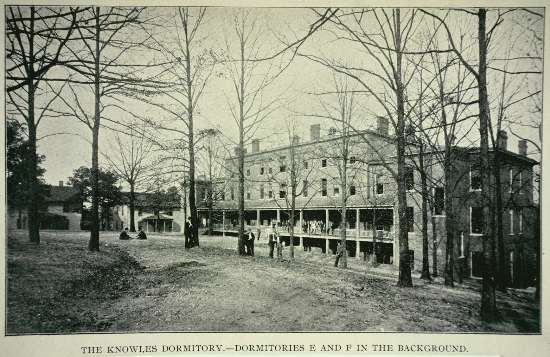 |
gtanno189899-17
Location:
T171 .G42 G49x 1888-1899
Title: Date:
The Knowles Dormitory-Dormitories E and F in the background
1899?
Content:
The Knowles Dormitory. Dormitories E and F in the background.
History:
When Tech first opened, students found lodging and board in the surrounding area because no dormitory or
dining hall was available on campus. One of Hall's actions was to erect at a cost of $4000 two frame
buildings to house students. Students called these buildings the "shacks."
Representative Clarence Knowles of Fulton County was a tireless supporter of Hall's plan to build a
dormitory, arguing that dormitories would make the school accessible to the poorer students of Georgia.
Knowles even took his fellow legislators to the school to see for themselves the need for a dormitory.
In 1897, the legislature provided funds to build the dormitory. Bruce and Morgan, architects of the two
previous buildings on campus, won the architectural commission for the dormitory in 1897. The dormitory,
which opened in September 1897, was named for Clarence Knowles. The Announcement for 1898-99 notes:
"Professors live in the dormitories, and it is their duty to see that all students conform to the
regulations..They have charge of the physical training and development of students, and are instructors in
the academic departments. The price of board, exclusive of washing, fuel and lights, is about $8 per
month. The first payment is for $10 and is due on entrance, payable in advance." The Announcement for
1898-99 discusses the regulations for conduct, primarily relating to dormitory residence, noting, "The
students of the school have a record for good conduct, unsurpassed by any corps in the country. They are
required to obey but few regulations, the authorities bearing in mind the devlopment and best interests of
the student body. Every man is expected to conduct himself as a gentleman. When he fails in this, and
convinces the authorities that he has not come to work, his parents are requested to withdraw him."
Regulations required that students not leave school property without permission and provided instructions
for requesting leaves of absence from the Professor in charge. The Announcement noted" "no leave of
absence will be granted for theaters, or during the week for religious exercises, without written requests
from students' parents." Dorm life was regulated by the clock in the Academic Building and by a bell
system, with the bell for rising at 6:30 a.m. daily, except on Sunday. The bell for the call to quarters
was rung thirty minutes after supper, at which time students must retire to their rooms to study. Five
minutes after call to quarters, an inspection of each room would be held. After this inspection, visiting
e arge. The bell for
to leave the dormitory if found with playing cards in their possession. Students found with intoxicating
infractions in the rooms under their charge.